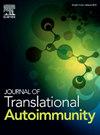双滤过血浆置换治疗自身免疫性脑炎的临床疗效和免疫调节作用:一项前瞻性研究,强调及时启动的重要性
IF 3.6
Q2 IMMUNOLOGY
引用次数: 0
摘要
背景和目的双滤过血浆置换术(DFPP)已成为治疗自身免疫性脑炎(AE)的一种血浆保存替代方法,但关于其临床疗效和免疫调节双重作用的前瞻性证据仍然有限。本研究旨在评价DFPP治疗AE的临床和免疫学效果。方法在这项前瞻性单中心队列研究中,纳入了2018年至2023年间57例根据国际标准诊断为AE的患者。参与者接受DFPP(中位3-5个疗程),单独或联合免疫疗法。主要结果是神经系统改善,通过修改Rankin量表(ΔmRS)的变化来衡量。次要结局包括症状改变(ΔCASE评分)、免疫参数变化和不良事件。根据抗体类型、治疗时间和联合治疗进行亚组分析。结果该队列患者中位年龄为47岁(IQR: 24-65),女性占49.1%。DFPP显著降低mRS评分中位数,从3.00降至1.00 (p < 0.001), CASE评分从3.00降至1.00 (p < 0.001)。整体功能改善率为71.9%。症状出现后14天内开始DFPP治疗的有效率显著提高(100% vs. 63.6%, p < 0.05),神经系统改善显著(p < 0.05)。与单用DFPP相比,联合IVMP或IVIG没有提高疗效(p = 0.600)。免疫学分析显示IgG(77.55%)、IgA(76.11%)和IgM(79.96%)显著降低,淋巴细胞亚群和细胞因子水平也有调节。28.1%的患者发生不良事件,主要是轻度导管相关血栓形成。结论sdfpp治疗自身免疫性脑炎是一种有效且耐受性良好的治疗方法,可显著改善神经功能,调节免疫反应。本文章由计算机程序翻译,如有差异,请以英文原文为准。
Clinical efficacy and immunomodulation of double-filtration plasmapheresis in autoimmune encephalitis: A prospective study highlighting the importance of timely initiation
Background and purpose
Double-filtration plasmapheresis (DFPP) has emerged as a plasma-saving alternative to therapeutic plasma exchange for autoimmune encephalitis (AE), but prospective evidence regarding its dual effects on both clinical efficacy and immunomodulation remains limited. This study aimed to evaluate the clinical and immunological effects of DFPP in AE.
Methods
In this prospective single-center cohort study, 57 patients diagnosed with AE according to international criteria were enrolled between 2018 and 2023. Participants received DFPP (median 3–5 sessions), either alone or combined with immunotherapies. The primary outcome was neurological improvement, measured by the change in modified Rankin Scale (ΔmRS). Secondary outcomes included symptomatic change (ΔCASE score), immunological parameter shifts, and adverse events. Subgroup analyses were conducted based on antibody type, treatment timing, and combination therapies.
Results
The cohort had a median age of 47 years (IQR: 24–65), with 49.1 % being female. DFPP significantly reduced median mRS scores from 3.00 to 1.00 (p < 0.001) and CASE scores from 3.00 to 1.00 (p < 0.001). The overall functional improvement rate was 71.9 %. Initiation of DFPP within 14 days of symptom onset was associated with significantly higher response rates (100 % vs. 63.6 %, p < 0.05) and greater neurological improvement (p < 0.05). Combination with IVMP or IVIG did not enhance efficacy compared to DFPP alone (p = 0.600). Immunological profiling revealed significant reductions in IgG (77.55 %), IgA (76.11 %), and IgM (79.96 %), along with modulation of lymphocyte subsets and cytokine levels. Adverse events occurred in 28.1 % of patients, predominantly mild catheter-related thrombosis.
Conclusions
DFPP is an effective and well-tolerated treatment for autoimmune encephalitis, significantly improving neurological function modulates immune responses.
求助全文
通过发布文献求助,成功后即可免费获取论文全文。
去求助
来源期刊

Journal of Translational Autoimmunity
Medicine-Immunology and Allergy
CiteScore
7.80
自引率
2.60%
发文量
33
审稿时长
55 days
 求助内容:
求助内容: 应助结果提醒方式:
应助结果提醒方式:


